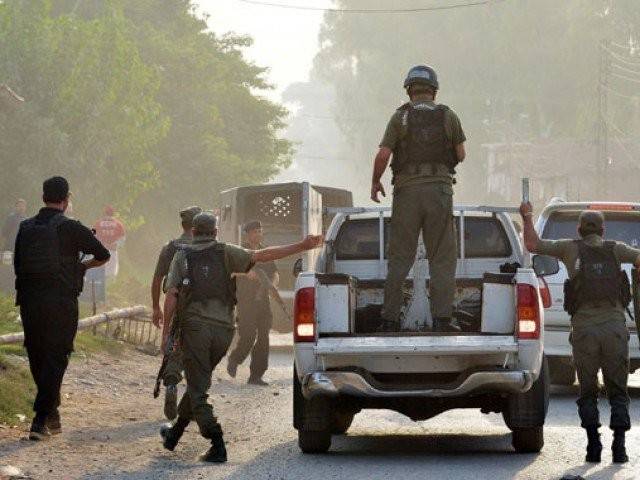ISLAMABAD: No doubt the security forces have been able to squeeze the life out of militants to a large extent, yet the terror threat remains potent as evident from the brazen attack on the Pakistan Air Force base near Peshawar Friday. Until September 18 this year, 365 civilians and 149 security forces personnel were martyred in various terror incidents. The forces killed 1,884 terrorists in the first nine months of 2015 and captured scores of other. In 2014, 1,781 civilians, 533 security troops and 3182 terrorists were perished in the wave of terrorism and counter terror actions.
The previous year, 2013, witnessed killing of 3,001 civilians, 676 security forces men and 1702 terrorists. While in 2012, 3,007 civilians, 732 security forces officials and 2472 terrorists were killed. From 2003 to 2015, 20,655 civilians, 6,278 security troops and 32,007 terrorists had lost their lives, according to an independent count. The numbers indicate the Operation Zarb-e-Azb operation has been successful in pushing the militants to the wall but work still needed to be done to eliminate the menace of terrorism completely.
The Washington Post recently reported that terror incidents had declined in the current year. “Over the past nine months, government statistics show major terrorist attacks have declined by 70 per cent and Pakistanis are flocking back to shopping malls, resorts and restaurants,” a WP report said. “The relaxed and optimistic mood in Pakistan was benefiting Prime Minister Nawaz Sharif politically,” it added.
Foreign Office says Pakistan has so far spent $1.9 billion from its own resources on operation Zarb-e-Azb and on return of Temporary Displaced Persons (TDPs).
FO Spokesperson Qazi Khalilullah said that the Coalition Support Fund (CSF) was reimbursement of the expenditures Pakistan incurred before the start of the operation. Islamabad is in talks with Washington for the release of CSF. The Friday’s attack on residential airbase camp of the Pakistan Air Force (PAF) in Peshawar leaving at least 29 people dead was another reminder, signifying there was still work left for the forces to complete. On Friday, Prime Minister Nawaz Sharif chaired a high-level meeting in Peshawar where he was briefed about operation against terrorists in Badaber airbase. Corps Commander Peshawar Lt. General Hidyatur Rehman briefed the premier on the operation. Sharif vowed to continue the operation against the militants until the last terrorist was eliminated.
Despite the prime minister and Army Chief Raheel Sharif’s commitment to defeat terrorism, analysts suggest terror-free atmosphere can be still a few years away. “There has been a significant improvement this year. But we should not underestimate the militants. They have been virtually defeated but will continue to take their chances,” observed one analyst.
Earlier, Defence Minister Khawaja Mohammed Asif had said the federal government was offering full assistance to the provinces for implementation of National Action Plan (NAP). The minister referred to the establishment of the military courts for quick disposal of terror-related cases.
Commenting on the situation, defence analyst Brigadier Mehmood Shah (Retd) said: “The law and order situation in the country has been improving due to the continuous efforts and sacrifices of Pakistan army in operation against militants.”
He added: “Now the operation is going into next stage and the facilitator of terrorism will be curbed in this phase. The funding of terrorism should be eliminated to bring sustainable peace to the country. The registration and monitoring of NGOs (Non Governmental Organizations) is also an important step to completely eradicate the terrorism from the country.”
Senior analyst Dr Talat Wazarat said: “Pakistan has suffered from conventional and non-conventional challenges since long. Its geo-strategic location is a double edge weapon. Its location may be a blessing if utilised and manoeuvred vigilantly by the state of Pakistan, or, same may be exploited by regional and extra regional actors if Pakistan turns a deaf air to its utility.”
“National Action Plan is a comprehensive strategy which addresses all the challenges and gives mechanism for post tactical operation situations. Irony is that corruption and terrorism are inter-twined and this mechanism must be broken. The public is keen to eradicate the terrorism from our soil. We have to develop consensus among all factions of society against non-state actors,” she opined.
Defence analyst Dr Huma Baqai commented the regulation and reforms of religious seminaries are quite significant for the proper implementation of National Action Plan. “We cannot blame all religious seminaries for terrorism but a strong monitoring system should be adopted to avoid the use of these seminaries for the abatement of terrorism. On the other end, the registration and monitoring of all NGOs are equally important for the maintenance of peace in the country. The government should monitor the funding and activities of all NGOs and religious seminaries and should restrain them in their respective areas only,” she said.
Analysts pointed out the civil and military leadership’s decision to prolong security forces stay in the volatile tribal belt validates the fact that the terror threat was still alive. Yet, the decrease in the number of terror attacks offered a silver lining that the militants had lost much of their strength and safe havens. “We must acknowledge the operation has been successful and soon the forces will be able to completely wipe out the terrorism,” said one commentator.






